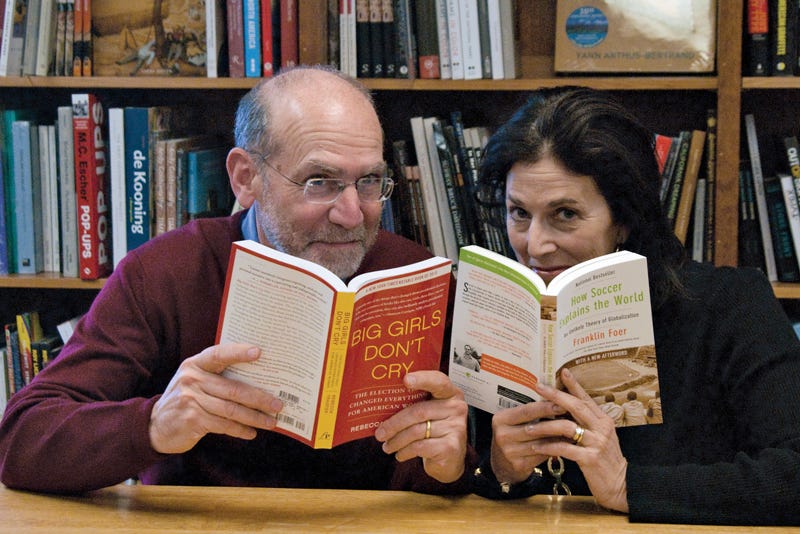Getting Things Done
Part Five: Great Bookselling is a Mission

“P&P is not just a place to buy a book or sip an espresso, though I make it a point to do both every time I’m in the vicinity. It’s also the venue for a long-running, often high-end free show: the frequent author evenings in which scribblers give little speeches, answer unusually intelligent questions from members of a usually well-informed audience, and get their egos stroked.”
— Hendrik Hertzberg in The New Yorker in June 2010, when the founders Carla Cohen and Barbara Meade put Politics and Prose, their bookstore in Washington, D.C., up for sale. He was worried, he wrote, that the store might close.
Fifteen years on, and now owned by Bradley Graham and Lissa Muscatine, Politics and Prose is by any apparent measure flourishing. The main Connecticut Avenue store has increased in size by more than 25 percent. There are two additional stores at the Wharf and Union Market, two snazzy new retail neighborhoods in Washington.Foot traffic in all three locations is strong. Books are well displayed. At the coffee shop inside the Connecticut Avenue store, the customers, deep in conversations or engrossed on their laptops, tend to linger. There are events, some with standing-room-only turnouts, recorded for viewing on the P&P website and on YouTube. There are reading groups, classes, and even a few guided trips.
On any list of Washington’s community assets, the Politics and Prose stores are near the top.
One evening, after an event, as people came up to Brad to thank him for the store, he commented to me, “That never happened when I was a reporter.” Brad joined the Washington Post in the 1970s, where we were colleagues. He spent a decade as a foreign correspondent for the Post in Europe and was national security editor and then a Pentagon reporter on the national desk.
He wrote two books for PublicAffairs — Hit to Kill: The New Battle over Shielding America from Missile Attack and By His Own Rules: The Ambitions, Successes, and Ultimate Failures of Donald Rumsfeld.
By nature and style, Brad is reserved, a person to be taken seriously. Lissa, a Rhodes Scholar who had also been a reporter at the Post and a senior member of Hillary Clinton’s staff at both the White House and the State Department is equally accomplished.
The point about all this description is that the owners of Politics and Prose are formidable and not inclined to self-congratulatory or celebratory proclamations about their achievements as booksellers.
So I decided to ask Brad about the enterprise as a business, assuring him that he could review my account to be sure it was accurate before it was published.
Here is some basic data. There are about 110 employees, including a chief financial officer and a chief operating officer who report to the owners. There are book buyers for adult and children’s categories, buyers for sidelines or merchandise, separate managers for the branch locations, events, marketing, programs, and the coffeehouse. There are around 530 in-store events a year, plus an additional 35 or so at outside venues to handle larger audiences. There are 12,000 “members,” who pay $35 a year, for discounts on purchases.
The staff is partially unionized. All three stores are in rented spaces: the Wharf store is in a building owned by Laurene Powell Jobs’s Emerson Collective, which also houses The Atlantic magazine, and the Union Market area is being developed by Edens, a national company with one hundred “open-air shopping centers and mixed- use retail assets,” which invited P&P to open a store as part of its “thoughtful community engagement and innovative property management.”
All well and good, but how is the business, meaning the revenues and profits that make it sustainable, and not (as Hertzberg once fretted in The New Yorker) vulnerable to the vagaries of commerce?
This is where Brad Graham’s seriousness comes into focus.
Brad’s family has a business background, and he earned an MBA at Stanford, but until acquiring P&P he had never used it. He was able to buy the store without going into debt to investors.
Here, in summary, is what he told me about how the numbers in bookselling are derived at P&P and generally in all independently owned bookstores, of which there are thousands in the United States.
Publishers mostly sell books to stores at about 54 percent of the list price. (Behemoths like Amazon and Barnes & Noble demand bigger discounts.) That means just under half the list price is where the revenue comes to pay the staff, rents, utilities, and capital improvements. The bottom line, says Brad, is a profit margin in the single digits — in good years. Most owners in the information and entertainment businesses would consider such a return on investment to be unacceptably paltry.
The largest percentage of store revenues comes from book sales, with “sidelines” merchandise (where profit margins are better than books) providing most of the rest. The economics of the coffeehouse is another matter, and only this year has it become profitable for P&P.
Put it all together and what have you got? In the case of Politics and Prose, unquestionably one of the best bookstores in the country, a stable enterprise but definitely not one to render its proprietors as moguls.
Why do it?
With all the people I encounter who I say are “Getting Things Done,” there is a common mission: making a meaningful contribution to civic society. And that is their major return on investment, which is why customers at P&P are thanking Brad and Lissa.




I love P and P and have presented there many times. And here's another piece of good news for literature in America.
https://apnews.com/article/literary-arts-fund-publishers-26784d44c1c3fc4be6cf9a867511ce4a?utm_source=join1440&utm_medium=email&utm_placement=newsletter&user_id=66c4bec75d78644b3aa1709e